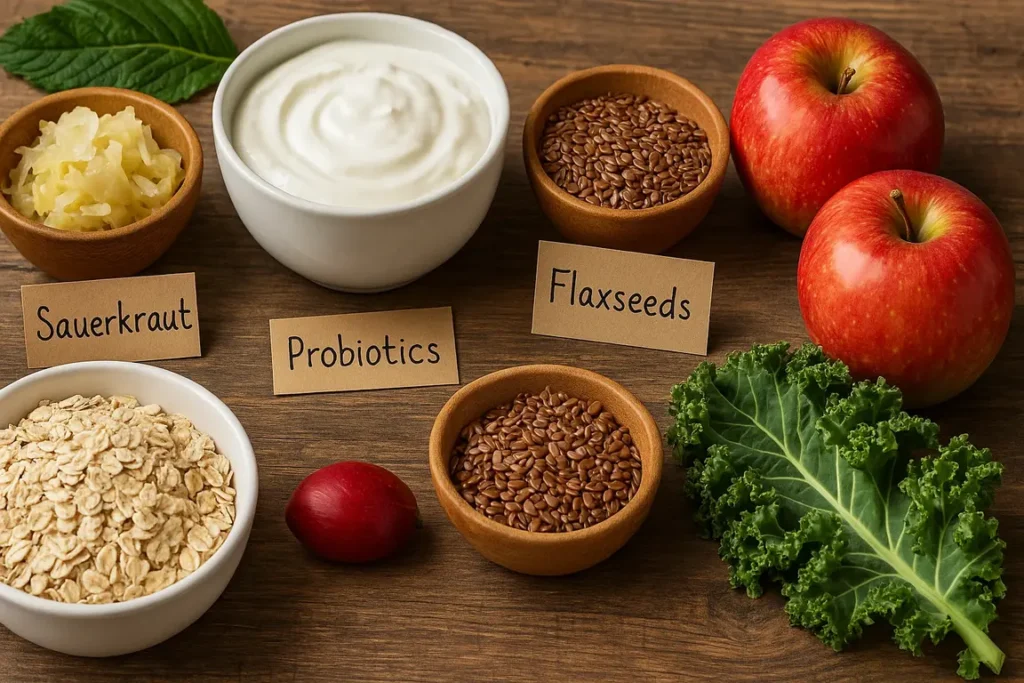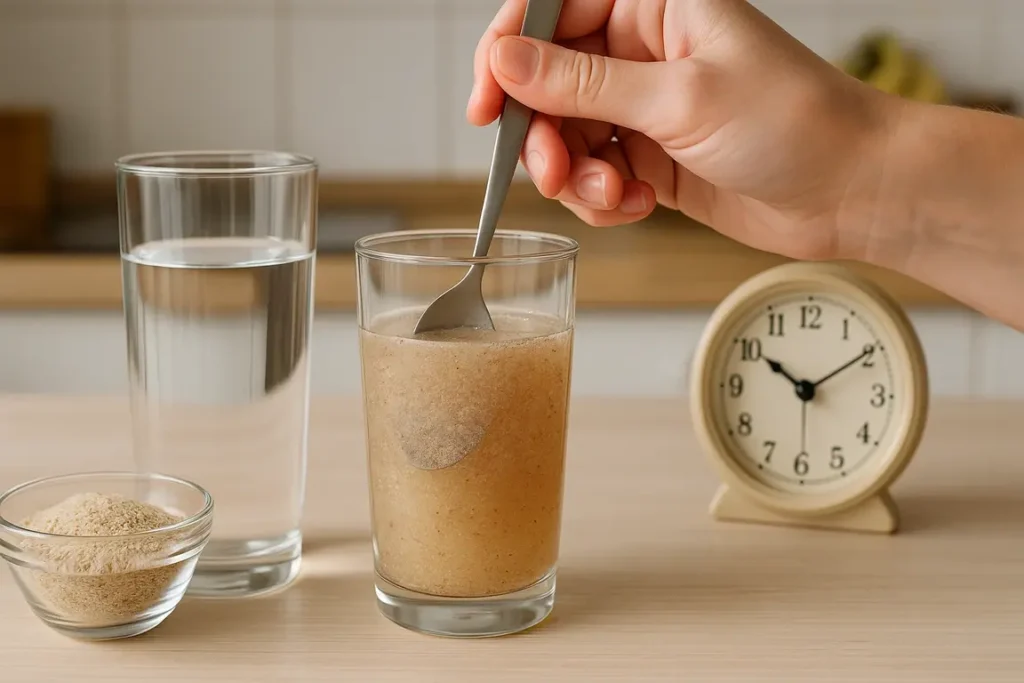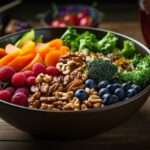Your colon works hard every day to remove waste from your body and maintain your health. However, it sometimes needs a little assistance. Here are 10 natural products and processes for colon cleansing that can give your digestive system the boost it deserves.
Many people feel sluggish or bloated and wonder if their colon is functioning properly. The good news is that nature offers many safe ways to support colon health, methods that have been used for thousands of years.
A clean colon can help you feel more energetic. It may also improve your skin and boost your mood. Dr. Michael Greger, a nutrition expert, says,
A healthy gut is the foundation of overall wellness
What Is Colon Cleansing?
Colon cleansing is the process of removing waste and toxins from your large intestine. Your colon naturally eliminates waste through bowel movements. But sometimes, waste can build up on the colon walls.
This buildup can happen for several reasons:
- Eating too much processed food
- Not drinking enough water
- Lack of fiber in your diet
- Stress and lack of exercise
Accumulation of waste can lead to feelings of fatigue or discomfort. A natural colon cleanse aids your body in safely removing this buildup.

Why Choose Natural Methods?
Natural colon cleansing is a gentler alternative to harsh chemicals or invasive procedures. These methods align with your body’s natural processes and, when used correctly, do not cause harmful side effects.
Additionally, natural approaches offer extra benefits. They often contain nutrients that support overall health, including fiber, vitamins, and minerals that your body needs.
10 Natural Products And Processes For Effective Colon Cleansing
1. Water—The Ultimate Cleanser
Water is essential for maintaining colon health. Your body requires a sufficient amount of water to help move waste through your digestive system. When you don’t drink enough, waste can become hard and difficult to pass.
How much water do you need? Most adults should aim to drink 8 to 10 glasses of water each day. Start your day with a large glass of warm water; this can help awaken your digestive system.
Consider adding a squeeze of fresh lemon to your morning water. Lemons are rich in vitamin C and contain natural acids that support digestion. Additionally, the citrus can help stimulate bowel movements.
2. Fiber-Rich Foods—Nature’s Broom
Dietary fiber functions like a broom in your colon, sweeping away waste and toxins as it passes through your system. Your colon needs two types of fiber:
Soluble fiber: This type dissolves in water and forms a gel-like substance. It helps slow down digestion and promotes a feeling of fullness. Good sources of soluble fiber include:
- Oats and oatmeal
- Apples and pears
- Beans and lentils
- Carrots and sweet potatoes
Insoluble fiber: This type does not dissolve in water. It adds bulk to your stool and helps waste move quickly through your colon. You can find it in:
- Whole-grain breads and cereals
- Brown rice and quinoa
- Leafy green vegetables
- Nuts and seeds
Aim for 25–35 grams of fiber daily. Add fiber slowly to avoid gas and bloating.
3. Probiotics—Friendly Bacteria
The colon is home to trillions of bacteria, some of which are beneficial, while others can lead to health issues. Probiotics are the good bacteria that support a healthy digestive system.
These beneficial bacteria assist in breaking down food and absorbing nutrients. They also help combat harmful bacteria and enhance the immune system.
Natural sources of probiotics include:
- Plain yogurt with live cultures
- Kefir (fermented milk drink)
- Sauerkraut and kimchi
- Kombucha tea
- Miso soup
Make sure to include probiotic foods in your daily diet to help maintain a healthy balance of gut bacteria.
4. Psyllium Husk—The Gentle Bulking Agent
Psyllium husk is derived from the seeds of the Plantago ovata plant and is one of the most effective natural colon cleansers available.
When mixed with water, psyllium husk can swell up to 50 times its original size, creating a gel-like substance that gently sweeps through the colon. This process effectively picks up waste and toxins along the way.
Additionally, psyllium husk serves as a food source for beneficial bacteria in the gut, helping to maintain a healthy digestive environment.
How to use psyllium husk:
- Start with 1 teaspoon of psyllium husk mixed in 8 ounces of water
- Drink immediately before it thickens
- Follow up with another glass of water
- Take it 30 minutes before meals
Always ensure you drink plenty of water while using psyllium husk. Insufficient water can lead to blockages.

5. Apple Cider Vinegar—The Digestive Aid
Apple cider vinegar (ACV) has been utilized for centuries to promote digestive health. It contains natural acids that aid in breaking down food and eliminating harmful bacteria.
Additionally, ACV may help balance the pH levels in your colon, creating an environment where beneficial bacteria can flourish.
How to use apple cider vinegar:
- Mix 1-2 tablespoons of ACV in a glass of water
- Drink this mixture 15-20 minutes before meals.
- If you are sensitive to acidity, start with 1 teaspoon instead
- Always dilute ACV – never drink it straight.
Choose raw, unfiltered apple cider vinegar that contains “the mother,” a cloudy substance rich in beneficial enzymes and bacteria.
6. Flaxseeds—Omega-3 Powerhouse
Flaxseeds are a small yet powerful nutritional powerhouse. They are packed with both soluble and insoluble fiber, making them excellent for maintaining colon health. Additionally, flaxseeds are rich in omega-3 fatty acids, which help reduce inflammation.
The fiber in flaxseeds contributes to the formation of soft, bulky stools, making it easier to pass waste and reducing strain on the colon.
How to use flaxseeds:
- Grind them fresh for better absorption
- Add 1–2 tablespoons to smoothies or yogurt.
- Sprinkle ground flaxseeds on salads or cereal
- Drink extra water when eating flaxseeds
To prevent ground flaxseeds from becoming rancid, store them in the refrigerator.
7. Aloe Vera—The Soothing Healer
Aloe vera is well-known for its ability to heal burns, but it also supports colon health. The gel found inside aloe leaves contains compounds that soothe inflammation and promote healing.
Additionally, aloe vera has a mild laxative effect, which helps to soften stool and encourages regular bowel movements. It also contains enzymes that assist with digestion.
How to use aloe vera:
- Choose food-grade aloe vera gel or juice
- Begin with 1-2 ounces daily
- For optimal results, take it on an empty stomach
- Seek products that do not contain added sugars or artificial ingredients
Start with a small amount to see how your body reacts, as some people may be sensitive to aloe vera.
8. Herbal Teas—Gentle Stimulation
Certain herbal teas have been used for centuries to support digestive health. These gentle remedies can help stimulate bowel movements and soothe the digestive tract.
Senna tea is one of the most popular natural laxatives. It contains compounds called sennosides that stimulate colon muscles. Use senna occasionally, not daily, as it can become habit-forming.
Peppermint tea helps relax digestive muscles and reduce gas. It’s gentle enough to drink daily and tastes excellent, too.
Ginger tea stimulates digestion and reduces nausea. It also possesses anti-inflammatory properties that benefit the entire digestive system.
How to prepare herbal teas:
- Use 1 teaspoon of dried herbs per cup of hot water
- Steep for 5-10 minutes
- Drink 1-2 cups daily
- Choose organic herbs whenever possible
9. Magnesium—The Muscle Relaxer
Magnesium is a mineral that plays a crucial role in helping muscles relax throughout the body, including the muscles in your colon. Many people do not consume enough magnesium in their diets.
Magnesium helps draw water into the intestines, which softens the stool and makes it easier to pass. Additionally, it aids in regulating muscle contractions in the colon.
Natural sources of magnesium:
- Dark leafy greens like spinach and kale
- Nuts and seeds, especially almonds and pumpkin seeds
- Whole grains and legumes
- Dark chocolate (in moderation)
You can take magnesium supplements, such as magnesium citrate or magnesium oxide, for colon cleansing. Start with a low dose and gradually increase it.
10. Exercise—Movement For Better Movement
Physical activity is often an overlooked factor in maintaining colon health. Exercise stimulates the muscles in your digestive tract, which helps move waste through your system more efficiently.
Additionally, regular exercise reduces stress, a factor that can negatively affect digestion. It also improves blood flow to your digestive organs and aids in maintaining a healthy weight.
Best exercises for colon health:
- Walking—aim for 30 minutes daily
- Swimming—gentle on joints but effective for digestion
- Yoga—specific poses massage internal organs
- Cycling—the motion stimulates abdominal muscles
Engaging in even light activity is beneficial. Opt for the stairs instead of taking the elevator. Park your car further away from stores to encourage walking. Every bit of movement contributes positively.

Creating Your Natural Colon Cleansing Routine
You don’t have to use all these methods at once. Begin gradually and pay attention to your body. Here’s a simple routine to help you get started:
Morning:
- Start your day with a large glass of warm water with lemon
- Take psyllium husk 30 minutes before breakfast
- Have a fiber-rich breakfast that includes ground flaxseeds
Throughout the day:
- Drink plenty of water to stay hydrated
- Include probiotic foods in your meals
- Take short walks after eating to aid digestion
Evening:
- Enjoy a cup of herbal tea after dinner
- Perform gentle stretches or yoga to relax
- Consider taking a magnesium supplement if needed
When To See A Doctor
Natural colon cleansing is generally safe for healthy adults. However, certain situations may require medical attention, including:
- Severe constipation lasting more than a week
- Blood in your stool
- Severe abdominal pain
- Sudden changes in bowel habits
- Signs of dehydration
Individuals with specific health conditions should consult their doctor before starting any cleansing program. This includes those with diabetes, heart disease, or digestive disorders.
Safety Tips For Natural Colon Cleansing
Follow these guidelines to cleanse safely:
- Start slowly with any new cleansing method.
- Drink plenty of water throughout the day.
- Avoid using harsh laxatives on a regular basis.
- Pay attention to your body and stop if you feel unwell.
- Maintain a balanced diet that is rich in whole foods.
- Engage in regular exercise and manage stress effectively.
Remember, your colon does not require constant cleansing. These methods are most effective when incorporated into a healthy lifestyle rather than being seen as a quick fix.

Conclusion: Your Path To Better Digestive Health Starts Today
Imagine waking up feeling light, energized, and ready to take on the day. That’s what a healthy, clean colon can do for you.
The ten natural methods we’ve explored are not just about cleansing your colon; they’re about transforming how you feel every day. You can experience more energy, a better mood, clearer skin, and improved digestion. These benefits are waiting for you.
Here’s the beautiful truth: you don’t need expensive treatments or harsh chemicals. Nature has already provided everything your body needs. Water, fiber, probiotics, and simple lifestyle changes can work wonders.
Start small. Choose just one or two methods from this list. Perhaps it’s drinking more water with lemon each morning or adding ground flaxseeds to your breakfast. Small changes can create big results over time.
Your body is incredibly smart. When you provide it with the right tools and support, it knows exactly what to do. These natural approaches work with your body’s inherent wisdom, not against it.
The journey to better colon health doesn’t happen overnight. However, every positive step you take brings you closer to feeling your absolute best. Your future self will thank you for starting today.
Are you ready to feel the difference? Your colon—and your entire body—is waiting for the support only you can provide.
Remember to consult with healthcare providers before making significant changes to your health routine, especially if you have existing medical conditions or take medications.
Medical Disclaimer
This article is for informational and educational purposes only and is not a substitute for medical advice, diagnosis, or treatment. Always consult a healthcare professional with any medical questions or before starting a new health regimen. Do not disregard professional advice based on this article, as results may vary for individuals.






